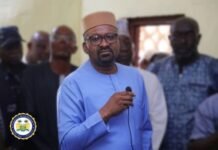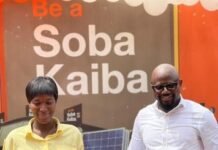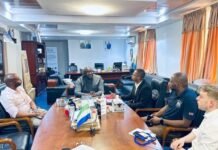By Amin Kef (Ranger)
During the first convocation and Congregation of the Ernest Bai Koroma University of Science and Technology, on the 19th January, 2023, which attracted personalities from all walks of life, the Dean of the Sierra Leone Consular Corp, Director & Member of the Board of Governors, Chairman Equinox Group, Chairman DStv, Chairman Capital Radio 104.9, Chairman PIKIN BIZNESS, a renowned philanthropist, Dr Adonis Abboud, was among other speakers that delivered statements.
Speaking on the theme: “Leveraging Research, Science and Innovation to Address Current and Future Issues of Higher Education in Sierra Leone” he stated that the sad commentary of our educational system from the sky-high level of pre-independence when it earned the enviable sobriquet of ‘Athens of West Africa’, through the giddy days of the late seventies and early eighties and of course the decade-long civil war of the 1990s and the upheavals of Ebola and Corona Virus epidemics, put into context, the significance of the day’s event, the theme of the convocation and indeed the giant strides of the past five years.
He noted that education in Sierra Leone has experienced notable advances in recent years especially since the advent of the current administration whose determined effort has led to the investment of a large chunk of its resources on education which, according to him, is a paradigm shift in the way the nation conceptualizes education.
“The strenuous effort of the Government, to not only pay serious attention to education in its real sense, but to ensure that no stone is unturned in the quest for excellence, has seen the sector move from the previous stability of a lottery ball in a tombola to global recognition,” he informed adding that wise people have opined that it is much more difficult to formulate effective solutions to initiate a reversal of any abject retrogression, such as has been the case in Sierra Leone’s education policy.
He said, however, it is clear that in the process of development time comes when opportunities arise for a determined people or leadership to evaluate the past, appreciate the present and look forward to a glorious destination.
Dr Abboud intimated that while the forum is just a continuation of the tireless effort to rededicate to the determined march for excellence and the highest height of the creative and productive capabilities of Sierra Leoneans, we must not lose sight of the obstacles and realities of our society and nation.
According to him Knowledge is power adding how the world is in a frenetic speed and has become more competitive, more globalised, more dependent and highly more propelled by information technology.
He said if we do not want to be left adrift, we have no choice but to race against time with all hands on the deck, and mobilized, to overturn the inhibited developmental status that still trails our efforts.
Dr. Abboud said leveraging research and technology will no doubt not only help to combat known and unknown emerging threats to development adding that effectively doing so is essential for wealth creation and is a key component of social integration, sustainable development and poverty eradication, based on equity, freedom, justice, governance, peace and prosperity.
He asked: “Why have we found it difficult to create a world class higher educational system especially at the university level which can filter down to the quality of those who will propel the system from the immediate level to others below?”
Again he asked: “Apart from the historical past when the ruling circle saw the country, not as a society to passionately believe in, but one which was more of a vehicle for personal advancement, which other inherent factors undermine the ability to attain excellence and is responsible for our underdevelopment and the ability to become the great nation that we can be?
He said among other things that we need to look at why the political class has not been able to solve our developmental problem through research and innovation maintaining that our weakness is technology yet politics and religion occupy all the spaces; leaving very little for science and critical thinking asking why is that the case. What is wrong and what can we do over and beyond current efforts to accelerate the pace of innovation and rate of success? What are the root causes of slow translation, and what can we learn from recent failures and successes in translation?
Dr Abboud revealed that our ancestors embraced science, technology and innovation in their daily activities by using locally available materials for their food, nutrition, drugs and medicine as well as local materials for the construction of their accommodation.
He said unfortunately, today, the stranglehold of beliefs and tradition on our thinking as well as the negative impact and understanding of social media and technology, are some of the things that are keeping us back stressing that people must have the freedom to question beliefs and rely on their evidence without fear.
According to him, Science, Technology and Innovation remain the main driving force of growth and development underscoring that as the Government continues to demonstrate its invaluable role and commitment it is imperative that increased attention is paid to the study of science and technology, right from the primary school.
He informed that Technology can be a boon for any system when incorporated correctly; otherwise, it can increase unnecessary expenditures stating how it is therefore essential to know what a system requires before developing and incorporating new technologies. According to him, sometimes that requires a critical assessment of the status quo, and sometimes, it requires looking into the future.
He pointed out that no doubt financial constraints play a significant mitigating factor in the rate of the future source of growth, infrastructure and research maintaining how it is essential to carry out a critical assessment of the status quo and sometimes look into the future in the development and incorporation of new technologies at each step.
Dr Abboud said there is a school of thought which believes that Government’s commitment to science and technology is measured by how much money is spent adding that money is important both for the quality and quantity but it is an input, not an output measure.
He suggested that reducing bureaucratic burden in research, innovation and higher education, can be overcome by the establishment of an independent fund that will be equitably distributed to institutions to encourage the study of science and research as well as lay the solid knowledge foundation for development.
Dr Abboud said that every country that has developed has prioritized the study of science and technology adding that access to higher education goes beyond the admission of more qualified students as it also means that high performing indigent students are given merit-based scholarships and all the encouragement and enabling environment to succeed.
He argued that Science and technology are not liberal arts created from the mind adding that we need state-of-the-art laboratories, libraries and uninterrupted power.
He recommended the building of quality and relevant universities and other higher institutions responsive to the visions and missions for which they are established, independently funded outside the control of politicians is necessary.
Dr Abboud also suggested that Government must enthrone enabling policies encouraging the country’s corporate world to intervene in core Science, Technology and Innovation (STI) and once the perception changes whereby such funds are not seen as grants but as self-perpetuating investments with potential for innovative application to products and services; and which require beneficiaries to return part of their profits to the fund, then we can be assured that we are on our way to progress.
He informed that the power of science and technology lies in information sharing adding that lack of shared ideas and assets between higher institutions and international institutes are contributing to poor performance in science.
“Bright minds frustrated by loneliness, limited resources and collegiate apathy are left with no choice but to rely on prayers rather than technology,” he stated.
According to him, if we want to leverage anything at all, there is the need to break the stranglehold of conformism that tends to emasculate products of higher institutions and instead, steer them towards research and innovation.
He said that new thinking will challenge them to create wealth using their heads in the area of science, technology and innovation that created the founders of Microsoft and Facebook that we love so much.
Dr Abboud said in pursuant of that we need innovative and updated curricula that breeds intelligent, self-motivated and curious students confident enough to do things differently and which will stimulate curiosity and motivation.
“In other words our higher institutions must be inculcated into the world of “internet of things,” artificial intelligence and robotics to produce the likes of the Ghanaian student who has just developed an African search engine to rival the likes of Google,” he stated.
He said we need to allow the leaders of our future unfettered intellectual freedom if all the current efforts at leveraging the educational system is to yield the desired result.
“One way of overcoming this obstacle is through the introduction of digital technology into the classroom,” he said adding that academics must be armed with laptops to enable them access the social media in addition to catching up with their own students who will no longer be limited by time and space.
He said that we must pay attention to and encourage specialization adding that our higher institutions must be equitably supported to excel in disciplines where they have the highest capacity and expertise. “Specialization saves resources while encouraging collaboration, quality teaching and research,” he said.
He also suggested that Foreign Experts, especially of Sierra Leonean heritage, must be encouraged and recruited where the requisite skills are lacking locally; especially to start their own research institutes back home, which would have the multiplier effect of facilitating technology transfer and set some of our universities on the trajectory of excellence.
Based on what he said greater collaboration with the diplomatic and consular corps can also help towards achieving this goal.
He said to the graduating set that it is his hope that they will realize that they are the hope of the nation.
“You are its future. You can become whatever you want to, if you will unleash your minds and with a renewed mindset from the frenetic development of the world, apply yourselves to the challenges facing Sierra Leone,” he said.
Quoting Tom Brokaw, Dr Abboud said, “You are educated. Your certification is in your degree. You may think of it as the ticket to the good life. Let me ask you to think of an alternative. Think of it as your ticket to change the world”.
He concluded by stating that the whole purpose of education is to turn mirrors into windows and replace an empty mind with an open one.
“With discussions such as this and the current determination to open up the nation to align with the rest of the world, you have in your hand, the most powerful weapon which you can use to change the world,” he inspired the graduating students.






cialis viagra combo pack cn and National Natural Science Foundation of China No
Click here for the Bottomline lasix dosage for edema
What Is Peyronie s Disease comprare cialis online